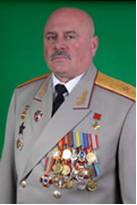Ihor Ploskonos

Ihor Ploskonos was born on April 26, 1959, in the town of Pavlohrad, Dnipropetrovsk region in the family of workers.
His father, Mykola, served in the artillery during the Second World War, was wounded several times and was awarded the Order of Red Star. His mother, Mariia, also served at the front, she ended the war in the rank of Sergeant of medical service. But at juvenile age, the heartbreak overtook him – his parents died in the car accident.
The boy was not left alone with his inconsolable grief – his teachers and neighbours helped him to go through it all. Only thanks to such caring people, the 14-year-old boy entered Kyiv Suvorov Military School and his fate was predestined.
In 1976, after finishing Suvorov Military School, Ihor Ploskonos continued his studies in Baku Higher Combined Arms Command School. In the school, Ihor was keen on sports and became the officers’ multiathlon master of sports, and he also joined the Transcaucasian military district combined team.
After graduation from the military school, Lieutenant Ploskonos received an appointment to the Far East military district, where he took the lead over the air assault platoon. In December 1981, his military unit received an order concerning the selection of officers to serve in the Democratic Republic of Afghanistan (DRA). The desire to serve there expressed several officers, including Lieutenant Ploskonos.
In Afghanistan, I. Ploskonos was appointed as the deputy commander of the reconnaissance troop of 783rd separate reconnaissance battalion of 201st mechanized infantry division in Kunduz.

Later, he was appointed as the commander of reconnaissance troop of that reconnaissance battalion. It was a severe test. Not everyone could be a commander of the reconnaissance troop in Afghanistan in 1981-1984, withstand it all and, in addition to that, successfully accomplish the assigned tasks. The activity of opposition groups reached its all-time high. Besides, the year of 1984 was proclaimed the year of revenge by mujahedeen. That year became the bloodiest period of the whole Afghan war. 2343 Soviet servicemen were killed.
The company of Senior Lieutenant Ploskonos has also suffered losses. One of the first officers killed in the company was reconnaissance platoon leader Senior Lieutenant Oleh Antonenko, who is buried in Kyiv.
From the memoirs of Ihor Ploskonos: “The intensity of the activity was really crazy – if we went “to work” at night, we had only half of the day to rest, and vice versa. Only before large-scale operations we were able to have 2-3 days’ rest. Today, when you meet people or read commendation list where it is written that a person took part only in 18 combat operations during the service in the DRA, it is unclear what this person has been doing for two years there”.

In September 1983, the company’s personnel under the command of Ihor Ploskonos went on the road Kunduz-Khanabad at night and laid an ambush. 24 rebels were trapped with famous field commander so-called doctor Shamson who had influence over the Kunduz province. Mujahideen were annihilated, but all the reconnaissance servicemen stayed alive. For that operation, Senior Lieutenant Ploskonos was awarded the Order of Red Star.
I. Ploskonos carried out many combat operations in Afghanistan. But one of his most difficult moments during the service in the DRA was participation in Marmol ravine operation in order to release Soviet civil specialists captured by insurgents.
It should be noted that Marmol ravine considered inaccessible. In the ravine, insurgents built a powerful system of long-lasting fortifications and strong points which protected large cave depots with arms and ammunition. Those were the storages that supplied armed opposition groups fighting against Soviet troops in the north of Afghanistan. The ravine’s defence was ensured by more than 1300 insurgents.
To block the grouping of mujahideen in the ravine, the operation area was surrounded by the Soviet units which were assigned not to let the militants to withdraw from the ravine. One of the companies deployed there was commanded by Ihor Ploskonos. The company’s task was to block the Bazarak pass and keep mujahideen in the encirclement. According to the command, the company had to stand there for 3 days, but it appeared to be 10 days of struggle.
From the memoirs of the former chief of intelligence of 201st mechanized infantry division Mykola Kuzmin: “The blocking units were assigned not to let mujahideen to go from the encirclement. The major blow was inflicted on the company of Ploskonos. The weather was non-flying and our aviation could not help. More than three days the company had to beat off the enemy in total encirclement. Ploskonos skillfully located his firepower and constantly guided the attached artillery means…”.

On November 15, 1983, according to a Decree of the Presidium of the Supreme Soviet of the USSR, Ihor Ploskonos was awarded the title of Hero of the Soviet Union “for skilful command of the company during the combat mission in Marmol ravine in the Bazarak pass region, Balkh province, for saving the personnel’s lives, as well as for displayed courage and heroism”.
After the returning from Afghanistan, I. Ploskonos continued his service in Turkestan military district, in the Southern group of forces, and in Ukraine. He also graduated from Military Academy in Moscow.

Ihor Ploskonos changed his uniform into a civilian suit after he had been elected people’s deputy of Ukraine of the first convocation. Later, he held other positions of the highest importance in the Verkhovna Rada, the Cabinet of Ministers and the Ministry of Emergency Situation of Ukraine. From 2007 to 2011 Ihor Ploskonos headed the State Veterans Committee of Ukraine.
Ihor Ploskonos died on July 8, 2013.